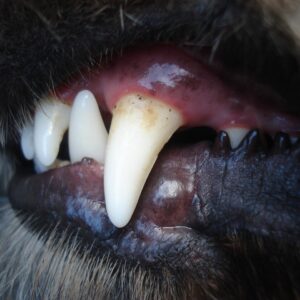Rimadyl for dogs

Formulation
Tablets
Active ingredient
Carprofen
Category
Pain relief / anti-inflammatory
What is Rimadyl?
Rimadyl is a brand name for a drug with the active ingredient carprofen. It is a Non-Steroidal Anti-Inflammatory Drug (NSAID), a type of drug that stops the body from producing inflammatory substances. In this way, Rimadyl reduces pain, inflammation and fever in dogs with with various conditions (e.g. injury, joint disease, post-operative pain)
What does Rimadyl do?
Carprofen, the active ingredient in Rimadyl, is known as a Non-Steroidal Anti-Inflammatory Drug (NSAID) that targets and blocks the action of COX-2. COX-2 is a protein that facilitates the production of inflammatory substances. These inflammatory substances (prostaglandins) cause pain, inflammation and fever.
By blocking the effects of COX-2, Rimadyl reduces inflammation. This helps to manage pain in dogs after surgery. Rimadyl also manages pain that occurs with many short-term (acute) and long-term (chronic) conditions. Thus, dogs with these conditions (e.g. joint disease) can enjoy an improved quality of life with Rimadyl. Furthermore, Rimadyl lowers inflammation-induced fever in dogs
What is Rimadyl for?
Rimadyl is used to manage pain and inflammation associated with a variety of short-term and long-term conditions in dogs. These conditions include (but are not limited to):
- Joint Disease : Rimadyl is commonly prescribed to dogs with joint issues to reduce pain and inflammation. For instance, dogs with degenerative joint disease (osteoarthritis) are often prescribed Rimadyl. This improves their mobility and comfort.
- Postoperative Pain: Rimadyl may be used for postoperative pain management in dogs undergoing certain surgical procedures (e.g. dental surgery, bone /joint surgery, spay/neuter surgery).
What are the possible side effects with Rimadyl?
Rimadyl (carprofen) is generally well-tolerated in dogs. However, like any medication, it may have potential side effects. It’s important for pet owners to be aware of these possible reactions. Speak to your vet immediately if you notice any of these signs in your dog.
Possible side effects of Rimadyl include:
- Gut upset: Some dogs may experience gut upset, including vomiting or diarrhoea. If there is fresh blood and/or tarry stools, sores on the gut lining (gut ulcers) may be present.
- Sores on gut lining (gut ulcers): Prolonged use or higher doses of Rimadyl may cause gut ulcers.
- Decreased Appetite: Rimadyl may reduce appetite in some dogs.
- Changes in Behavior: Rarely, dogs may exhibit changes in behaviour, such as reduced activity (lethargy) or increased irritability.
- Kidney Damage: NSAIDs, including Rimadyl, can affect kidney function. It’s essential to monitor for excessive drinking and urination, which may indicate kidney issues.
- Liver Damage: While rare, liver damage may occur. Affected dogs may have yellowed eyes, gums and/or skin (jaundice).
- Allergic Reactions: In very rare cases, dogs may experience an allergic reaction, characterised by swelling, itching, or difficulty breathing.
Remember, not all pets will experience these side effects, and the benefits of using Rimadyl often outweigh the risks. However, if you notice any concerning symptoms or changes in your pet’s behaviour or health while they are taking Rimadyl, it’s important to contact your vet immediately. They can provide guidance and adjust the treatment plan if necessary to ensure your pet’s safety and well-being.
Which pets is Rimadyl not suitable for?
Generally speaking, Rimadyl is not suitable for the following pets:
- Dogs allergic to Rimadyl or any other NSAID (Rimadyl tablets are flavoured)
- Dogs that are already on other anti-inflammatory drugs (e.g. other NSAIDs, corticosteroids).
- Dogs that are pregnant, lactating or intended for breeding
- Dogs under 6 weeks of age
- Dogs with bleeding disorders
- Dogs with dehydration, heart problems, kidney problems and liver problems
The above pets are at a greater risk of side effects from Rimadyl.
If your dog has any of the above issues and your vet prescribes Rimadyl, your vet will discuss the risks involved and the importance of close monitoring.
How to give Rimadyl safely
- Follow vet instructions: Always use Rimadyl exactly as your vet has prescribed. This includes the right dose and frequency. Never adjust the dose on your own, even if your dog seems to be feeling better or worse. If you aren’t sure of the dose prescribed, please call your vet to confirm.
- 2. Give with or after food: It’s safest to give Rimadyl on a full stomach, to reduce the risk of side effects. You can either put it on your pet’s food or feed it directly to your pet after they’ve eaten.
- 3. Check with your vet if giving anything else: Your vet should be aware of other drugs your pet is on, but it’s always worth double-checking in case there’s been a miscommunication somewhere. If your dog is on supplements or non-prescription treatments you should also tell your vet when they prescribe Rimadyl, as they may not be suitable to be given together.
- Dogs are at greater risk of side effects if they have been prescribed Rimadyl and they are already on other anti-inflammatory drugs (e.g. other NSAIDs, corticosteroids). If your vet wishes to switch your dog from another anti-inflammatory drug to Rimadyl, your dog will be taken off the previous anti-inflammatory for a certain amount of time (a “washout period”) before being started on Rimadyl. Therefore, you should also tell your vet about your dog’s past medications.
- 4. Storage and Handling: Store Rimadyl according to the instructions on the packaging, usually in a cool and dry place (below 25°C). Wash your hands after giving Rimadyl to your dog. Make sure it’s out of reach of children and other pets.
- 5. Report any overdose to your vet immediately: If you have mistakenly given too much Rimadyl, report it to your vet as soon as you realise the error. They may recommend blood tests, decontamination, supportive care(e.g.intravenous fluids), or monitoring, depending on the severity of the overdose.
Rimadyl FAQs
Does Rimadyl for dogs make them sleepy?
Rimadyl for dogs can make them sleepy (lethargic). However, the sleepiness should only be mild and short-lived. If the sleepiness is prolonged or severe enough to affect your dog’s daily activities, contact your vet immediately.
Does Rimadyl work immediately?
Rimadyl does not work immediately. However, it takes a short time to work. It can take 1-3 hours to observe the effects of Rimadyl.
Are Metacam and Rimadyl the same?
How does Rimadyl make a dog feel?
At a proper dose, Rimadyl makes a dog feel less painful and uncomfortable. Rimadyl can also improve mobility as it can make a dog more willing to move around. The level of improvement will vary amongst dogs, with some dogs showing significant improvement.
Should I give my dog Rimadyl in the morning or at night?
You should give your dog Rimadyl according to your vet’s instructions. Your vet may prescribe Rimadyl as a once-daily dose (either in the morning or at night). Alternatively, your vet may choose to split the dose into two and ask you to give your dog half a dose in the morning and half a dose at night.
Rimadyl Datasheet
All drugs have a manufacturer’s datasheet, which gives information about the drug’s use and possible side effects. There is usually one in your Rimadyl box, but if you have lost it you can click on the button below to be taken on an online version.
Courses related to Rimadyl
Please note that the information contained herein is provided for informational purposes only. Although it has been written by a vet, we cannot consider the individual nature of your pet’s problems so it does not constitute veterinary advice. If you have questions about your pet’s medication or their health you should contact a vet, who will be able to help.


